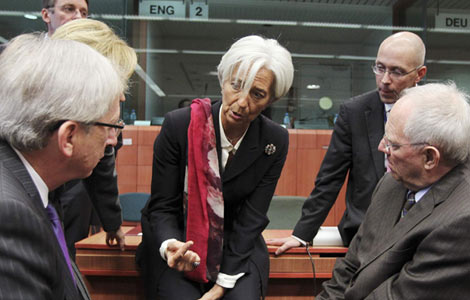CPC turns to culture to sustain nation's rise
Updated: 2011-10-22 15:46
(Xinhua)
|
|||||||||||
BEIJING - China's Communist Party chiefs ended their annual policy meeting this week with a decision on cultural reforms as the world's second largest economy seeks to maintain its culture amid globalization and enhance its soft power abroad.
The communique issued after the meeting said culture is the source of national unity and creativity, an element of national competitiveness and a pillar of economic and social development, and that Chinese people are eager for a rich cultural life.
It is the first time in years that China's ruling party, the world's largest with 80 million members, has held a plenary session of its 365 most senior officials to call for a shift in focus from the booming economy to addressing the voids that success has left.
China's top leaders agreed that the cultural reforms must aim to promote the "socialist core values," which is the soul of China's push to build a prosperous nation, according to the communique.
Their move to redefine culture shows a resolution to change a long-standing fact that China's traditional culture has been undermined and even torn up by those who view it "in a utilitarian and superficial way," said Zhou Ximing, professor of the Party School of the Communist Party central committee.
BROADER HORIZON
China's cultural demands were overshadowed by a requirement for survival during what historians call the "century of humiliation" that began in the mid-19th century, Zhou said, adding that even after the People's Republic of China was founded in 1949 culture was often "dwarfed" by political movements and economic development.
"However, our culture, once restored and enhanced, will provide an enormous impetus to the national rejuvenation in front of the rising tide of cultural globalization," he said.
Peng Lin, a history professor at Tsinghua University, said China had turned to exotic theories for its national strategy in the past century, but its take-off today needs to be sustained by its own culture and ethos which, unlike technologies, can never be borrowed from elsewhere in the world.
"That's why the Communist Party should turn to the nation's civilization and wisdom accumulated over the past thousands of years to pilot the gigantic nation."
The party, as a promoter of China's fine traditional and advanced culture, will strive to improve citizens' sense of identity and confidence within Chinese culture, according to the communique.
The wording signals a broader-minded attitude that China is going to adopt toward what has been left by ancestors -- a break from a past period when traditional culture was sometimes wrongly judged and treated, Zhou said.
"For instance, Confucianism was once under violent attack as feudal rulers' ideological tool to maintain power. But Confucianism, which focuses on the cultivation of virtue and maintenance of ethics, has long embodied the ideals of Chinese people," he said.
"Not all things associated with feudal times should be abandoned. Chinese must first rebuild their cultural and historical identity before they can make themselves more respected in the world and united in case of a crisis."
Peng points out that Chinese civilization has endured for thousands of years largely thanks to the moral system established by ancient Chinese sages that regulate how people behave and interact with others.
But as China tries to eliminate poverty and achieve sustained economic growth, the most ancient civilization is frequently criticized for cultural superficiality and short-term interest orientation. Meanwhile, modern Chinese are under the pervasive influence of Western culture.
CORE VALUES
"If you want people to strive for their nation, you must make them base their values on a sense of national identity and confidence in the nation's culture," Peng said.
"The top leaders' decision to make cultural building a priority shows they see an important responsibility on their shoulders, after drawing lessons from the past," Zhou said. "This week's meeting is a fresh move by the governing party to eliminate the barriers to cultural development."
Regarding values as the core of all civilizations to address why people live and what is the most important to people, scholars said the Communist Party members must humble themselves to foster and advocate values that are compatible with ancient wisdom, people's needs and the beliefs common to most nations.
"Values are not cold logic, but something that can touch and warm people's hearts," Zhou said.
While China has achieved economic success after decades of reforms, the communique made it clear that "culture needs innovation most because it sets the fashion of the age" and vows to promote cultural prosperity.
Likening China's cultural landscape to "an ecological forest," Zhou said flourishing vegetation relies on both external irrigation and sunlight and the internal growth motivation.
"As the power of culture comes from the mind and heart of each member of society, cultural prosperity must rely upon a stronger cultural consciousness of the whole society instead of rigid top-down preaching and organization," Zhou said.
Under the rejuvenation blueprint set by the Communist Party, Chinese people will lead a rich life both materially and culturally when a well-off society is achieved by 2020.
"It has never been easy for the Party to lead more than one billion people through a decades-long modernization process on their own soil," he said.
"Modernization in the West, however, took some 500 years and had to rely on a colonial expansion to territories totaling 40-to 50-million square km. Today the total population of developed Western nations is only a little more than one billion," he said.
To facilitate China's modernity and achieve the national blueprint, Peng Lin said that a feasible strategy must be put into place.
Since the industrial revolution started in the 18th century, the world has been amassing material desires and now must face the common challenges of a worsening environment, moral decline and a lack of credibility.
"Many Western scholars suggest employing Oriental wisdom to open up a new future for the world. It indicates that China may contribute to the world by finding a different model of development based on its own culture while absorbing the essence of all civilizations. That is a real test for the Chinese Communist Party," Peng said.
Related Stories
CPC Central Committee plenum ends with cultural development guideline 2011-10-19 13:57
Cultural development concerns realization of modernization 2011-10-19 09:31
Boost cultural industries 2011-10-19 07:55
5 northern places agree to have cultural exchanges 2011-10-19 07:16
Hot Topics
Libya conflict, Gaddafi, Oil spill, Palace Museum scandal, Inflation, Japan's new PM, Trapped miners, Mooncake tax, Weekly photos, Hurricane Irene
Editor's Picks

|

|

|

|

|

|







